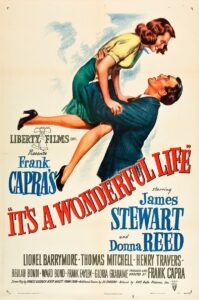I am pleased to introduce Andrew Bendelow as our guest blogger today. A retired school teacher, Andrew joined our weekly Zoom class this past year and generously agreed to share this little ditty — a fresh look at a classic holiday story — with you Safe & Sound readers.
It’s a Wonderful Lie
by Andrew Bendelow
Around this time of year, my wife and I look ahead to the holidays, when the desire to spend time with adult children and grandchildren is large. I make a suggestion or two for events that could bring us together with the younger generations, then she proposes something we’ve been doing every year for the past several. “Let’s reserve tickets for ‘It’s A Wonderful Life’ at American Blues Theater.”
“Well, we’ve done that the last several years. Maybe they’d like something else better.”
“It has always been wonderful.”
The discussion ends, because almost everyone finds it wonderful. I, too, am a sucker for the story. I, too, thrill to George Bailey’s supernatural happy ending. The film and its forms — like the one at the American Blues show — have been popular with Baby Boomers and Gen Xers since they were raised watching it on public TV in the 70s and 80s. But at least a couple of Gen Zers I know look forward to experiencing this “holiday classic” every year
I wonder why? What feelings, values, or hopes does this narrative carry for today’s young adults?
Perhaps the same that made Dickens’ A Christmas Carol a best-seller in the 1840s and after: its suggestion that something like social justice or fairness is possible within capitalism, that human compassion and “good will toward men” can actually win over greed.
Dickens’ mass audience of readers, well-acquainted with the horrors of the modern industrial workplace — child labor, huge wealth disparities, etc. — found in Scrooge’s story an escape from the dog-eat-dog marketplace to a wondrous place, where normal human lives mattered, and where even the frosty heart of a calculating businessman could open to the poor.
Tiny Tim’s “God Bless Us, Every One!” asserts a belief in a democratic benevolence sorely lacking in Victorian England, and thus fervently wished.
The 1946 Frank Capra fantasy directly descends from Scrooge, and as with Dickens, Capra’s Depression-era audience was wise to capitalism’s lies and abuses of power. His 1941 hit, Meet John Doe, according to a contemporary review, left film-goers with the hope “that some day, selfishness, fraud and deceit will be expunged from human affairs.”
Five years later, Capra delivered on that promise. He gave his audience “It’s A Wonderful Life,” set in a world where good guys like John Doe win in the end. To pull it off, his audience willingly accepts that the universe is unwilling to see a good man, in this case the Everyman, George Bailey, throw his life away merely for material reasons. Imagine a town in which people transcend self-seeking and surmount the merciless ethic of the marketplace. That place is Bedford Falls in Capra’s movie.
How nice to reside, even for the space of a two-hour show, in a world where individuals hold each other in high regard, and actually invest in each other’s well being. Perhaps there lies the secret of its appeal to Gen Zers, who know very well untrammeled ambition.
In the scene where George and his newlywed sacrifice their honeymoon money to keep the building & loan afloat, his words and generosity soothe the panic of the bank rushers:
“You’re thinking about this all wrong,” he tells the mob. “Your money isn’t here, it’s in Joe’s house, right next to yours, and then the Kennedy house, and then Mrs. Maclan’s house, and a hundred others. It’s what banks do.”
George is their teacher, reminding these wage-earners that the lending and housing markets can be human, too. “We’ve got to stick together,” he says. “We’ve got to have faith in each other!”
Fine and brave words. If only they were more often true!


Thank you Andrew. I too watch “It’s a Wonderful Life” annually and always, no matter how many times I’ve seen it, end up in tears. Your analysis gives a whole new reason to why is resonates so deeply. When I watch it this year, it will be with the new found wisdom you have inspired.
Thank you, Mel! I appreciate your appreciation!
Leave a Response